Who wouldn’t be frustrated and frightened to see smoke coming from the engine? a common question that arises in everybody’s mind that “Why my truck is overheating?” Overheating engines can do and happen when the vehicle is frequently used. It may cause imperishable and long-lasting damage if measures and actions are not taken properly. Overheating engines won’t only spoil your trip but the vehicle too.
The vehicle generates heat above the normal operating temperature. This heat distribution is managed by built-in cooling devices. Engine overheating means failing the cooling device’s operation and possibly cause imperishable damage to the engine. It also originates harm to hoses, seals, and gaskets that keep the engine running.
What happens when an engine overheats?
Today’s vehicles are built with devices that cool down the temperature when the heat is generated.
Vehicle overheating can cause various damages like blocked hoses from corrosion and mineral deposits, cooling system leakage, radiator issues, broken water pumps, and many more.
You can avoid these damages if a regular inspection is scheduled. You can also fix problems by yourself. Go through the cause of why my truck is overheating:
Why is my Truck Overheating?
Let’s explore some reasons for truck overheating one by one:
1. Cooling system leaks
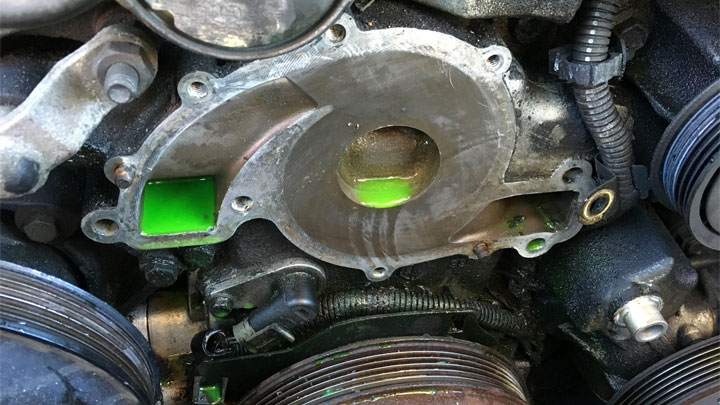
Potential leaks cause emptiness of reservoir tank which can be identified by some pores, spots and covering material on the ground.
It leaves stains on the track. Coolant must have a sweet smell and may look green or orange depending on the type of coolant being used in the vehicle.
2. Coolant Density
The vehicle overheats when an air conditioner stops working. If you see water or antifreeze levels constantly low get an appointment from your car service station.
One shouldn’t continue to drive if he sees the temperature gauge has touched the hot side. Driving an overheated engine can cause severe damage to your vehicle and result in very expensive repairs.
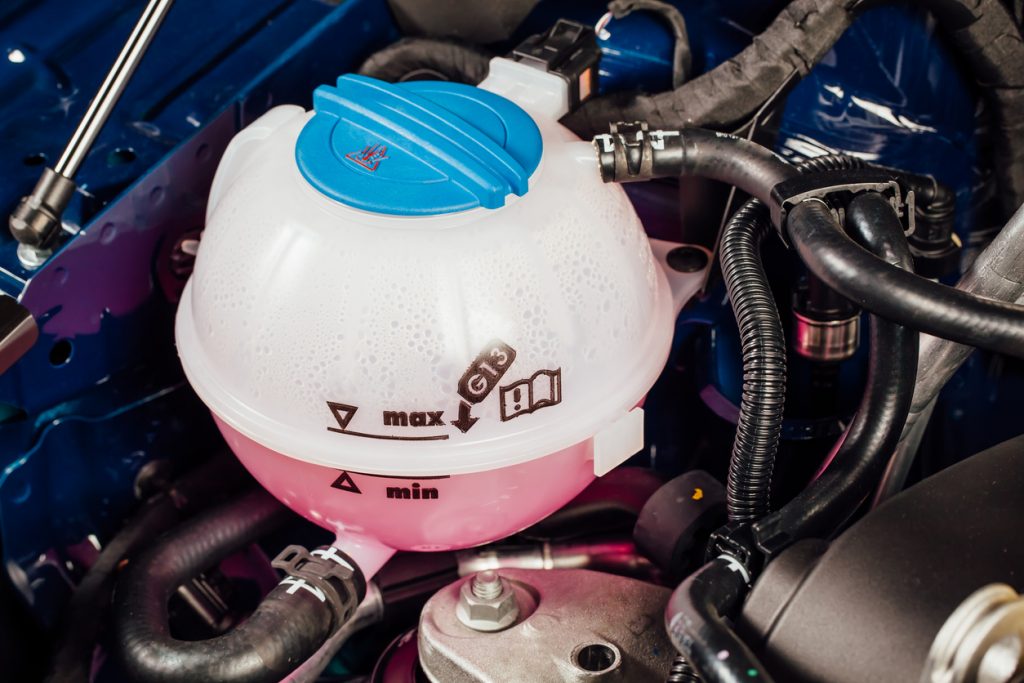
If you do so steam and scalding hot coolant may come outside and cause hyper-pigmentation to you badly. Wait an hour after the driving and then go for coolant level checking. Hopefully, this will solve your question why my truck is overheating.
3.Decreased Oil Level
Engine parts work smoothly when they’re lubricated with oil or grease. The vehicle’s oil overall controls the temperature and does more than just lubrication.
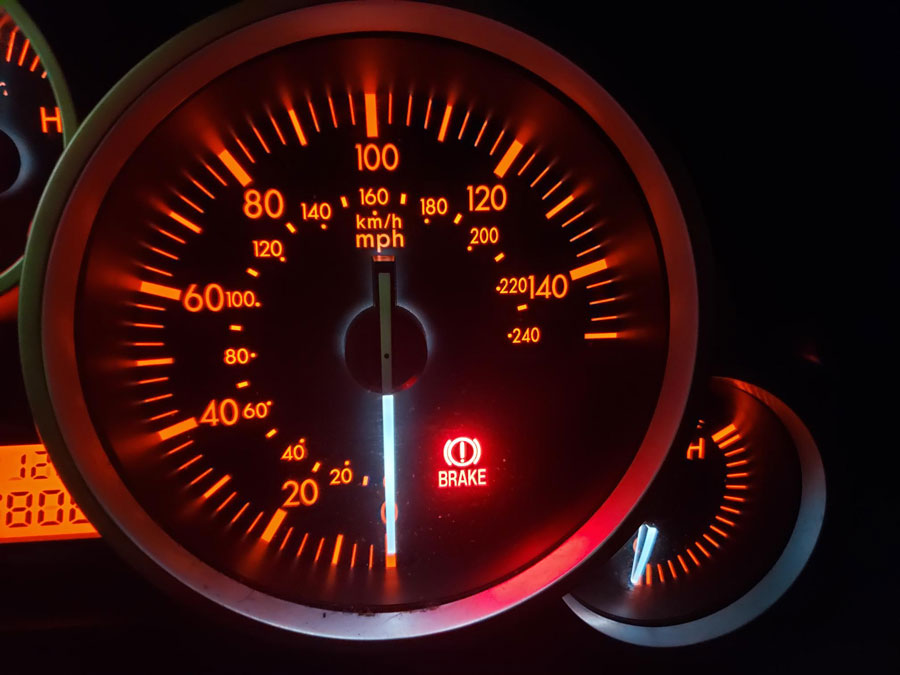
It helps to remove excess heat from the engine. When your vehicle gives you an alarming situation or your oil’s radiator moves the needle at the lowest means your engine temperature is increasing promptly.
Driving a truck with no oil means you’re getting a receipt of larger repair bills soon. Truck drivers who’re not familiar with the truck’s functionality won’t pay attention to what’s going inside the engine. They continue driving trucks with low oil levels which cause high engine temperature.
Higher temperature breaks down the lubrication power of the remaining oil and causes friction among piston rings, engine bearings, and valve lifters. More friction leads to more heat indeed!4. Bad Thermostat
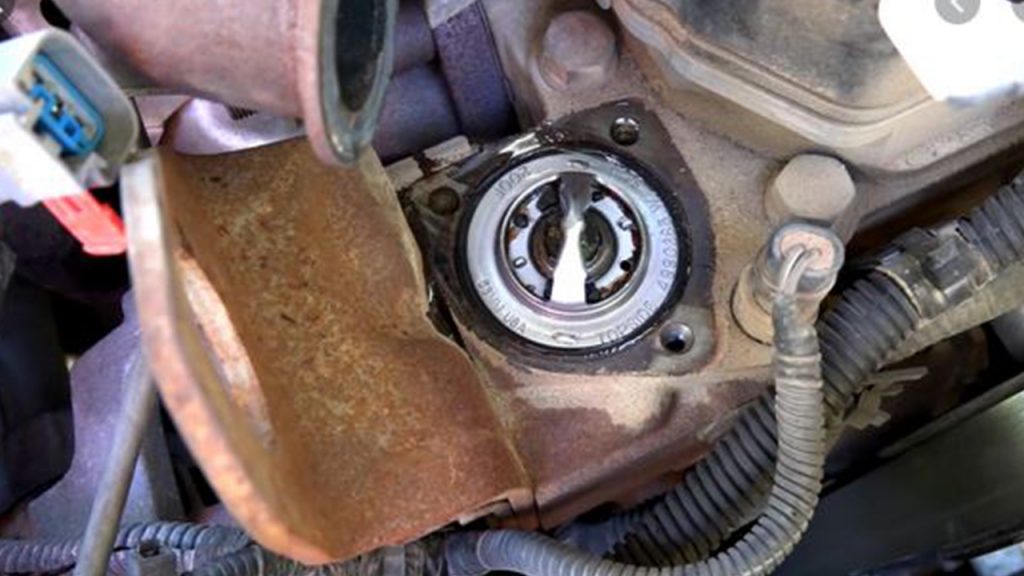
The cooling system is maintained by the thermostat that makes sure the availability of coolant in the radiator overall in the need of the hour. The thermostat can cause the engine to overheat in many ways like it can stick shut and stuck open or somehow partially open. Sometimes, it opens at the wrong temperature and breaks.
When the thermostat is stuck, it doesn’t circulate coolant to the radiator throughout that causes overheating in the engine.As soon as you get a sign of engine overheating, check instantly so that possible solutions can be implemented to solve the mystery of why the truck is overheating.
5. Closed Radiator
When a vehicle is on track, rubbish and leaves get trapped into the vehicle blocking the essential flow of air to the radiator. When the flow of air disturbs, the radiator can’t continue its functionality resulting in a poor cooling system.

It can’t pull the heat away from the rest of the cooling system. Sometimes, radiators get opened as pulling out a plastic bag or bunch of waste material that was sucked into the car on the driveway.
Make sure there’s not an obstruction blocking the grill or the area between the grille and radiator. Majorly things that get stuck into the radiator are a plastic bottle, cotton, wood tree, trash, and cardboard.
When it happens, air doesn’t flow through the radiator and transfer all heat out of the antifreeze. The place where you can find more debris is the fins of the radiator. Try to keep it clean or flatten them down so that truck won’t overheat./Mercedes_Benz_M104_engine_install_with_turbocharger_kit2C_radiator2C_Sturt_bar_by_MAD_Modify-5a57d4544e46ba00375e0369.jpg) 6. Bad Radiator Fan
6. Bad Radiator Fan
A radiator fan pulls the air across the radiator to cut down the coolant’s temperature through the engine. It keeps the vehicle safe and secure. As far as radiator fan clench or damage it can’t normalize the temperature and will result in overheating.
When you drive your car at a safe temperature but suddenly the temperature creeps up towards the high alarming zone, it’s definitely a sign of malfunctioning of cooling fans and truck running hot.
7. Bad fan clutching stops pulling air through the radiator
The radiator fan works well by tightening its screws. It pulls more air through the radiator when the cooling system heats up. The bad fan will stop spinning thus ceasing the air through the radiator dissipating heat and causing the truck to overheat.
To test the fan, spin it once when you feel that the cooling system is cold enough. Freely spinning of the fan indicates that the clutch is bad. Also, have look at the center of the fan clutch, if you see dirt and oil spots then the clutch needs to be replaced.8. Damaged Radiator Hoses
Damaged radiator’s hoses are the situation with which everyone is familiar and can easily relate. Cracks in hoses result in engine leakage that will disrupt the coolant’s flow.
The water pump stops circulating the coolant across the engine due to which it can’t reach every corner.
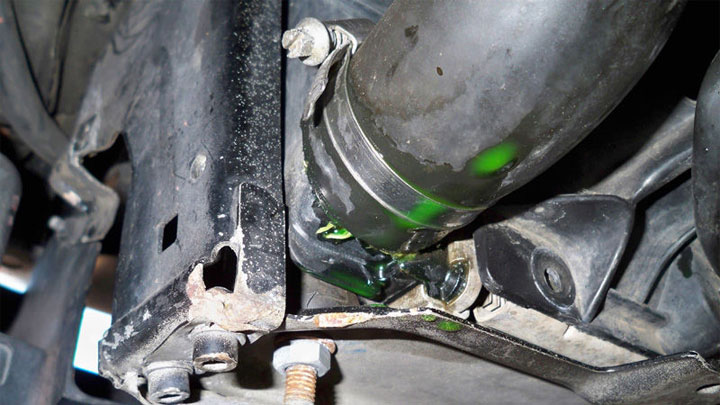
Knowing the problem doesn’t mean you can see it apparently. Some hoses come under severe pressure and bursts. While on the other hand, some hoses are cut into by a hose clamp pretending the clamp is loose and needs to be tightened but this is not the case ideally leave a sight on the clamp and hoses, soft spots, pinhole leaks, oil spots, and rub marks. Alter your hoses periodically.
Old hoses can be saved as spare hoses in your trunk. You may use them when you find nothing on highways. It will keep you on the safe side!
9. Issues with Fan Belts
In vehicles, possessing belt-driven fans, the belt can fall off and stop working. A defective belt of the fan won’t pull cooling air through the radiator. You won’t even feel the belt has broken if you’re going on the highway at high speed. Speedy vehicles tend to push air through the radiator.
Once you slow down your speed, no air will be pushed through a cooling system to the radiator resulting in overheating. Always check belts and gears before moving on highways or for longer routes.If you feel that gears may cause problems, won’t take risks and replace them all prior.
10. Bad water pump
Failure of the water pump leads to the inefficient circulation of coolant through the engine block. This causes overheating and if not repaired quickly may cause additional engine damage like pushed head gaskets, burnt pistons, and cracked cylinder heads.
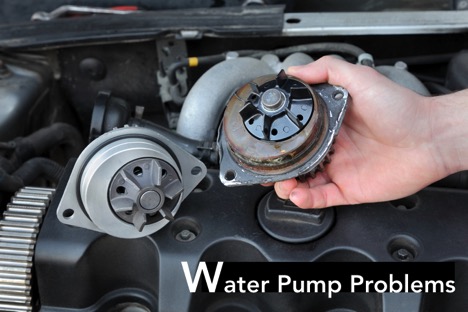
If you feel that the engine is running hot frequently or on regular basis then it may not a problem with the water pump.
In any situation, contact your mechanic and let things simplify, and get your water pump replaces with a newer one if needed.
The most difficult and hard-to-find problem is the water pump. If you’re done with every problem and still couldn’t find the cause of overheating start exploring the water pump.
The water pump usually fails but won’t cause leakage all the time except in some situations. It’s an internal defect and takes time to resolve. The possible solution is to remove the older water pump and check either it is defective or not.
11. Loose water pump pulley
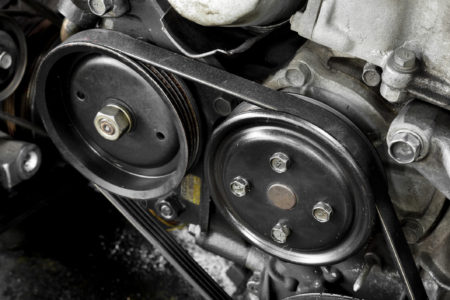
Have you ever heard a high-pitched noise while driving? That noise increases as you accelerate? On listening carefully, you realize that it is coming from the front of the motor.
This noise is caused by a loose belt around the radiator fan that starts creating harmonic buzz. Due to a loose belt, the pulley becomes loose or the bearing around the radiator worn out.Failed or damaged bearings inside the water pump indicated that no repair is possible and the only solution is to replace them with newer bearings or water pulley.
12. Steam coming from radiators

An instant sign of overheating is the steam coming from the front of the truck. When water pumps work correctly its temperature remains constant and consistent. Water circulation to the functioning radiator works correctly.
As soon as you see steam coming outside, look for a safe place, stop driving and immediately contact a mechanic.
Never try to drive an overheated engine, seek someone’s help but not drive your own car. It would save your money consumed on engine replacement.
13. Gaskets leaks

Gaskets do their job inside the engine which is pretty antipathetic and invisible. Constant disclosure to high temperatures, high pressures, and intact with hot fierce lubricants over a time period cause gaskets leaks.
Gaskets’ leaks start from spots under the truck and then gradually adopt catastrophic failure.While driving you may not notice the stains but on parking site spots are clear and visible to observe. If not taken care of it spots may become larger in size which in return oil wastage increases.
A quick fix can prevent you from major issues because small leaks even can lead you to lose a quarter of your oil within seconds.
14. Fouled spark plugs
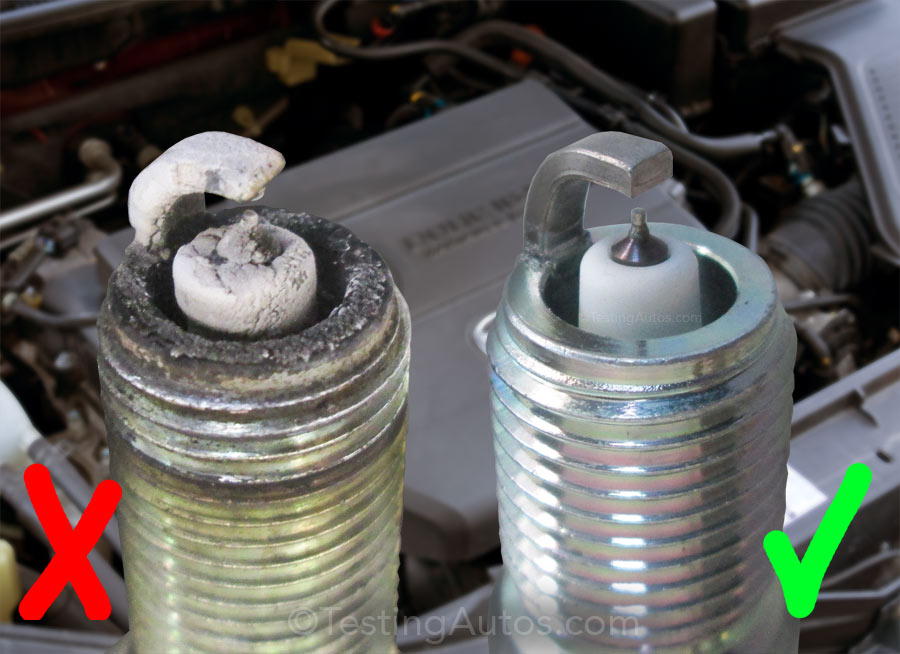
The spark plug becomes fouled when head gaskets and oil come in contact with the engine and cover the engine with a layer of oil or coolant. This may lead to disastrous situations like poor fuel economy, reduced performances, and misfires.
To avoid this problem replace fouled spark plugs with the new ones and then get the head gaskets fixed as well.
15. Faulty Radiator Cap
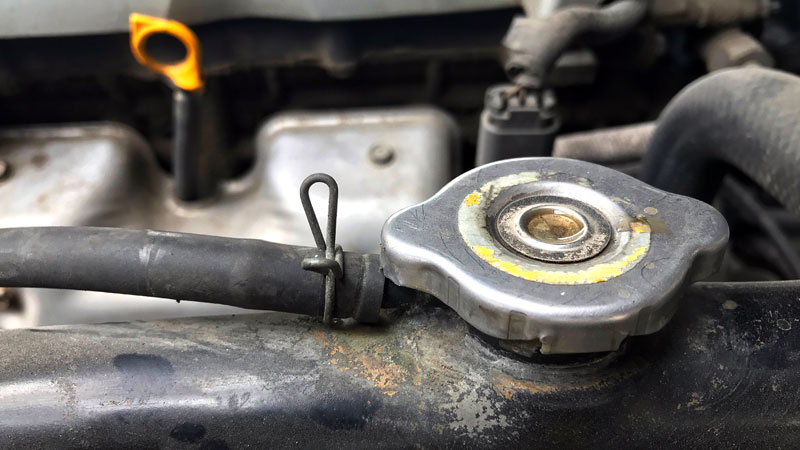
Very few people are familiar with the radiator caps of trucks. It’s commonly become a cause of overheating. It seems simple but complicated to handle a cooling system. A faulty radiator cap can lose coolant causing major engine harm. A pressurized cooling system helps you to overcome the situation.
The radiator cap pressurized the coolant inside the engine and expand at its best possible strength. Caps build pressure inside the engine at a specified level and let the excess pressure escape through a valve.16. Overflowing Reservoirs
As soon as coolant goes into the reservoir tank it starts expanding. The radiator cap is released with high pressure that pushes coolant towards the overflow tank. In case of using a faulty radiator cap, the coolant will move to the reservoir too quickly that may cause the reservoir to burst or boil over.

17. Air enters into the cooling system
when we repair or replace the cooling system’s part air gets into the cooling system. This happens through the radiator cap isn’t locked or closed properly. As a result, air packets will enter into the cooling system. Not only in the cooling system but radiator hoses, thermostats, and heater core too.
At that time, you need to remove the air trapped in the cooling system. It’s hard to tell if air has been trapped inside the system. You can check by double-clicking the fluid level and observe the gauge level right after repairing. Ensure to check antifreeze level at least once before driving and keep an eye on the gauge after cooling system installation.
Overheating occurs because it cannot uphold the temperature that is required.
18. Collapsing Radiator Hose

The most common cause of collapsing radiator hose is vacuum issue originate from the damaged or inaccurate radiator cap. A faulty radiator cap means its size and fitness over the cooling system.
When an engine cools down caps release negative pressure leaving liquid coolant in condensation. caps may expire after years or become too greasy to work with. The best possible solution is to change the cap with the same pressure rating.19. Clogging of radiators runoff hose
One of the most common overheating problems is clogging the radiator runoff hose leading to the coolant tank. The liquid returns to the tank as soon as the engine cools down. In contrast, if the fluid does not return to the tank it will cause a vacuum.
The reason behind its slow motion or not moving is clogged or dirty radiator likely to have some overheating problem. Always remember that never open the radiator cap from the blistery engine. Malfunctioning of the ignition system.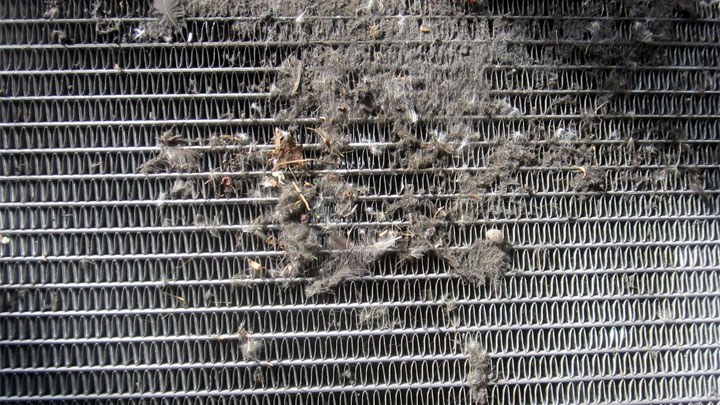
20. Late Ignition
If your ignition takes time to start, it may cause the vehicle to overheat due to multiple spark plugs. These spark plugs fire the fuel mixture from the top of the strokes as soon as the piston gets back to its original position. Late ignition cause overheating to only a few degrees.
It may catch strokes when combines with some other problems. As a result, the engine overheats to a critical point where it becomes difficult to handle the situation.
To confirm the truck’s radiator leakage, observe the hot engine and see if it is producing steam? A well-known and easy to comprehend symptom of radiator fluid leakage is its sweet musty odor. A leaking radiator produces coolant steams and leaves stains under the vehicle on the driveway or garage. Not really. Vehicle’s radiator cause overheating when the radiator fan doesn’t work properly or air packets enter into the cooling system. The radiator cooling fan is the most important spare part that is required to draw air through the radiator to escalate heat. It helps you to remove debris, plastic material, or waste from the engine. A defective and improperly locked radiator cap can also cause overheating. For detailed information, go through the above article. Do follow some precautions to cool down the engine: Anyhow, when you see overheating symptoms, stop where you’re and let your engine cools down for some time and then get back to roads at your speed. The above guide is designed for you to know about the vehicle why its engine is being overheated frequently. If you want to know more about 10 top tonneau covers go through the article 10 Best Tonneau Covers for Honda.Q1. How to confirm that my truck’s radiator is leaking?
Q2. Is a clogged radiator only cause overheating?
Q3. What to do if trucks’ engines overheat?
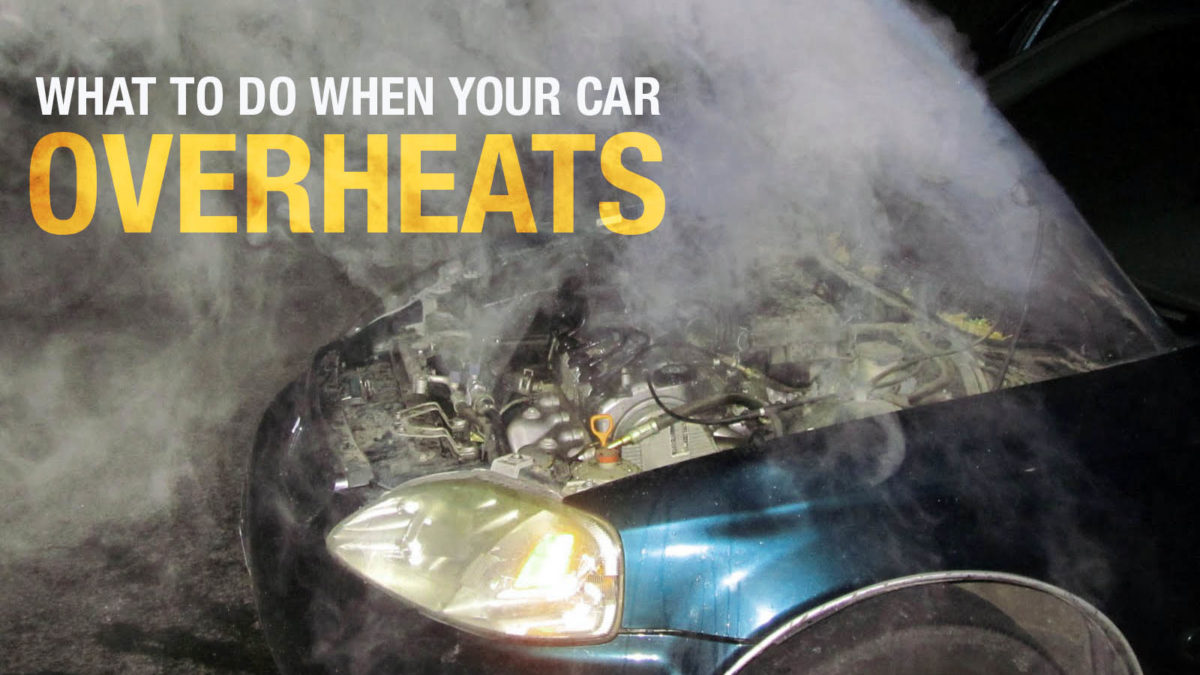
Conclusion

Leave a Reply